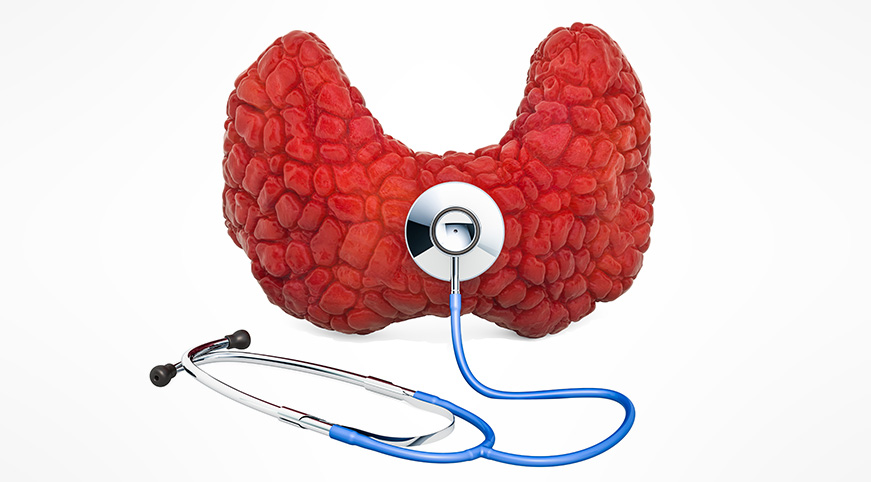Written by: Roni Laytin
Thyroid disease affects millions of people, especially women. According to the American Thyroid Association, approximately 20 million Americans have some form of thyroid disease and 60% of those with a thyroid disease are unaware of their condition. Since the causes of thyroid problems are largely unknown and the symptoms are difficult to recognize, it is best to monitor your health and follow a healthy lifestyle that contributes to thyroid health. Dr. Thomas Horowitz, Family Medicine Specialist at CHA HPMC, shares more about the condition and preventive measures.
What is the Thyroid?
“We can think of our thyroid gland as a thermostat for our body. It impacts our weight, energy and temperature. Skin and nail growth are also affected. When it is overactive, it can make one hyper, increase heart rate, and decrease body weight. There can be eye disease, as well. On the other hand, when the thyroid is underactive, there is weight gain and lethargy. Hair loss can be a symptom also,” says Dr. Horowitz. “With any concern, a simple thyroid-stimulating hormone (TSH) blood test can indicate a problem. With any of these changes, a discussion with your physician may help in early diagnosis.”
Types of Thyroid Diseases
For unknown reasons, the thyroid gland is at a high risk for autoimmune disorders such as Hashimoto’s Thyroiditis (underactive thyroid) and Grave’s Disease (overactive thyroid). Both disorders are caused due to inadequate levels of TSH. As a result, the immune system creates antibodies that attack healthy thyroid hormones as if they were a threat. This causes problems within the system and eventually deteriorates the thyroid gland itself.
Symptoms of Thyroid Diseases:
Underactive Thyroid (Hypothyroidism):
Nearly 5% of North Americans over the age of 12 are diagnosed with an underactive thyroid each year and the majority of these people are women and individuals that were assigned female at birth. Hashimoto’s disease is one of the most common underlying causes of the disorder which affects 1-2% of the entire US population. The most common symptoms of an underactive thyroid include, fatigue, tiredness, weight gain, dry skin, a puffy face, bulging eyes, dry and brittle hair and possible hair loss, unwanted hair growth (hirsutism), headaches, dizziness, insomnia, depression, and gastrointestinal problems. If you are experiencing any of these symptoms, please notify your doctor as soon as possible. According to the Office on Women’s Health at the U.S. Department of Health and Human Services, women who have experienced a thyroid problem in the past, had a surgery or radiotherapy affecting the thyroid gland, or have a condition such as goiter, anemia, or type 1 diabetes, are the most at risk for thyroid disorders and should speak with their provider about testing.
Overactive Thyroid (Hyperthyroidism):
The most prevalent symptoms of an overactive thyroid include, fast and irregular heartbeat, increased hunger and sweating, changes in menstrual cycles, tiredness, weakness, thinning skin, warm, moist skin, anxiety, insomnia, rapid weight loss, and gastrointestinal problems.
Thyroid eye disease follows hyperthyroid conditions more frequently than hypothyroid conditions. In Graves’ hyperthyroidism, the immune system attacks and damages the muscles and tissues surrounding the eyes, which reduces mobility within the eye socket and can rarely be severe enough to cause vision loss. These symptoms can be recognized during an eye exam. The symptoms and impact of the disease will oftentimes be reduced in severity with lubricated eye drops and/or prescribed corticosteroids which reduce swelling behind the eye, as well as wearing proper UV protected sunglasses and avoiding both direct sunlight and wind.
Preventive Measures
Besides testing and medication, lifestyle changes have an impact on thyroid disease symptoms. Some of the preventive measures include:
- Getting adequate rest.
- Avoiding stimulants (caffeine, nicotine, and sugar).
- Removing inflammatory and allergenic foods from your diet such as dairy, gluten, eggs (for some), and goiter-causing foods such as, genetically modified soy, raw kale, and night shade vegetables like bell peppers and tomatoes. A diet filled with warm, cooked, nutrient-dense vegetables and thyroid healthy vitamins such as Vitamin D, Magnesium, Selenium, and Zinc, along with plenty of clean protein from fish, chicken, and/or organ meats, along with complex carbohydrates such as those found in cassava (yucca) or sweet potatoes, has shown evidence of being helpful to thyroid health.
- Regular exercise is particularly important for those with thyroid diseases as it aids in regulating energy levels and hormonal processing. Thyroid diseases can also add to muscle and joint issues, so regular stretching and mobility can help protect muscle and joint health.
Though thyroid malfunction is prevalent in our country, it can be managed with the right combination of thyroid replacement hormone medication and healthy lifestyle and diet modifications. As thyroid symptoms are general and common, they can often be mistaken for other health conditions. If you are experiencing any of the above symptoms, please make an appointment to see your primary care doctor.
If you are concerned about possible thyroid eye disease, you can have your eye health assessed at the Southern California Eye Institute, our state-of-the-art, onsite eye clinic at CHA HPMC. Call (833)270-3937 to schedule your visit.
Go to our Blog
 ENGLISH
ENGLISH KOREAN
KOREAN Spanish
Spanish RUSSIAN
RUSSIAN Armenian
Armenian FILIPINO
FILIPINO Chinese (Simplified)
Chinese (Simplified) Chinese (Traditional)
Chinese (Traditional)

최신댓글